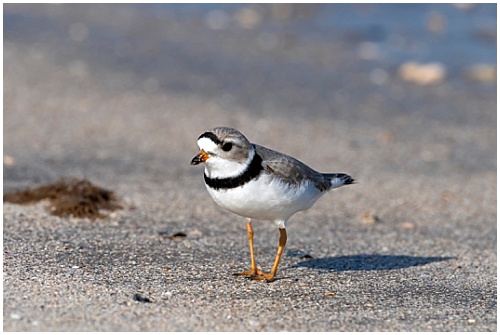September 20, 2021 at 4:02 pm
On the heels of another record-breaking year for piping plovers in Maine, this endangered beach-nesting shorebird had more pairs (125) and fledged chicks (213) on Maine’s beaches since intensive monitoring began in 1981. MDIFW is mandated to preserve, protect, and enhance the inland fisheries and wildlife resources of the state. This can be difficult to attain for a species vulnerable to climate change, sea level rise, predation, and recreating humans and dogs.
This work is achieved with the cooperation of many diverse stakeholders. We celebrate those partnerships as the work would not be possible without buy-in from several different groups.

Maine Audubon Society’s Coastal Birds Project is responsible for most of the boots on the ground management and monitoring. Biologists and outreach specialists travel thousands of miles throughout the busy spring and summer months, mostly in southern Maine, erecting miles of symbolic fencing and dozens of informational signs, lugging hundreds of pounds of equipment on the beaches, and working directly with landowners. They are truly the tip of the spear.
U.S. Fish & Wildlife Service is a critical partner as well. Biologists manage piping plovers on federally owned lands and other beaches, provide guidance for environmental review projects occurring in coastal ecosystems, and offer support on the several beach management agreements MDIFW has with municipalities.
U.S. Department of Agriculture Wildlife Services performs predator management on select beaches. Predation is a major risk to exposed beach-nesting birds and there is clear evidence that this work increases nest success and chick survival.
The Piping Plover Recovery Program would not have seen the population gains without help from several coastal municipalities. Many towns have beach management agreements to guide in how they can go about managing busy beaches while also looking out for piping plovers and other species. This includes essential assistance from town managers, public works, parks and recreation, police, fire, and code enforcement departments. Towns such as Ogunquit, Wells, Kennebunk, Kennebunkport, Old Orchard Beach, Scarborough, and the cities of Biddeford and Saco are key partners.
Many of these communities have incredibly devoted volunteers, some of whom log over 40 hours a week during the summer walking the beaches, educating the public about the birds and local dog leash ordinances, liaising with landowners, and monitoring their local plovers. To manage an armada like this, many municipalities employ a piping plover volunteer coordinator to oversee their substantial efforts.
Within MDIFW, the Maine Warden Service performs focused details during high visitation periods on weekends and holidays. In addition to law enforcement, game wardens on a beach have an impactful presence for many beachgoers who do not typically interact with our colleagues through fishing, hunting, or other outdoor activities. Wardens are always available to assist with unfortunate incidents that can cause harm to plovers.
All of these people serve integral roles for the impressive plover success Maine has experienced the past few years. Consistent messaging and education are important cogs in the wheel. With more landowners who allow piping plovers to coexist on ‘their’ beaches and more compliant dog walkers, the more success this program will continue to experience. We are indebted to all for their efforts to help sustain the Atlantic coast population of this endangered bird.
For a deeper dive into the piping plover numbers this year, we encourage you to read this blog from our Maine Audubon partners: Record-Breaking Numbers Don’t Tell the Whole Story